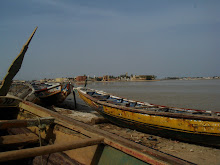A. The GRAMMAR mistakes have been corrected.... I think. I look forward to the corrections for this blog, seeing that I am using a FRENCH keyboard.
B. Responses to mother's questions:
What is an SIM card? --It is essentially the card that one purchases to have a cell phone number.
Does your family fast? --YES.... however, the kids do NOT fast. Kids generally do not begin to fast until they are 7-8 years old.
Are any of the other TOUBA fasting? --ONE is fasting, he has been fasting for three days. He said that it is most difficult to not be able to drink water.
Where have you been eating these yummy foods? At your family’s house? Are the foods similar to Ethiopian? Indian? Spicy, just like you like it though. Sounds tasty. Your blog is funny; your favorites all revolve around eating. --I have been eating these yummy foods with my family. I have had a couple of meals in downtown Dakar, but mostly I eat at my house. The food is similar to neither Indian nor Ethiopian; it is very spicy and consists of a lot of fish and very few vegetables. We all eat out of the same bowl, some people with their RIGHT hands, but most with spoons.
What is ACI? --Africa Consultants International
On another note....TODAY IS FRIDAY!!!! I am going to be heading home soon to eat dinner and break the fast with my family, then around ten I will be going to what we refer to as "Baobab IV".... or the local bar (There are three Baobab Centers where we take classes)! It should be a lot of fun!
Tomorrow, I am getting a traditional Senegalese outfit made for me for Korite (the festival at the end of Ramadan); I can't wait! This weekend should be pretty relaxing....maybe the beach and a run tomorrow (after hours and hours of classes this week, this will be VERY nice). For those of you that care.... the following is a more intense idea of what I am doing re: classes....
1. Wolof (75 hours)
2. Histoire d’Islam au Senegal: Xe –XXe siecles (45 hours-French): This course divides the history of Islam in Senegal into three parts: (1) La penetration de l’Islam au Senegal: Xe-XVIe siecles, (2) L’Islam face a la traite negriere et a la monarchie traditionnelle: XVIIIe-milieu du XIXe siecles, and (3) L’Islam, du milieu du XIXe- XXe siecles. The course includes visits to Islamic sites and has an “evaluation formative” & an “evaluation summative sur les pratiques de L’Islam”.
3. Dakar en Transition (60 hours-French): This course analyzes Dakar as a relatively young, new city that is going through cultural, structural, and economical changes (as the name entails). The course has a cumulative project.
4. Culture et Experience en Senegal (45 hours-French): This seminar focuses on students’ out-of-class experiences derived from their inter-relations with members of host families, grass-root communities, NGOs, ordinary people such as market vendors, maidservants, artists, writers, and other professionals. This course has a portfolio, final project, and journal assignments.
5. The Senegal River Valley (60 hours-French): This course discusses the developmental components necessary to help develop Senegal. This course is taught in St. Louis during the entire month of October.
AHHH!!!!! Take care and I will try to post picture soon!
Peace, Love, and Save the_________ (favorite animal-plural), ALEX
Friday, September 19, 2008
Subscribe to:
Post Comments (Atom)

No comments:
Post a Comment